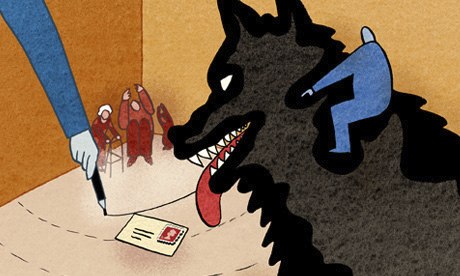Mark Steel in The Independent
Some people might react to the energy companies raising prices another 8 per cent by saying, “It shouldn’t be allowed.” If you’re one of those people, you should be aware that you’re like Stalin. Because after Ed Miliband’s speech in which he said he would freeze energy prices for a while, he was attacked for being like Stalin by several Conservative politicians and newspapers. So if your neighbour says today, “Ooh those blooming gas people, we shouldn’t let them to put their ruddy prices up again”, tell her, “You murdering bastard. I know your sort, first you starved millions of peasants to death, then you signed a pact with Hitler. Well I’m not afraid to stand up to you, even if you are likely to incarcerate me in a Siberian prison, Mrs Whittaker.”
This is the history that will soon be accepted, that communism collapsed when millions of people demanded that electricity prices were doubled. Heroic citizens stood on the crumbling Berlin Wall and proclaimed, “At last we are free to vote and listen to rock music and charge thousands of pounds for turning the radiators on.”
This is a common response now to any proposal that big business is suspicious of. The suggestion that landowners may be required to use some of their land for housebuilding, to “expand towns such as Stevenage”, was compared by the Institute of Directors to “Joseph Stalin’s notorious seizure of land from prosperous Russians.” For those not familiar with the methods of Stalin, he sent his army to shoot any farmers who didn’t hand over all their land to the state. So if you own a garden in Stevenage you’re in trouble.
Tanks will roll past Luton and on to Welwyn Garden City, rampaging soldiers ignoring the cries of children as they transfer the waste ground behind Stevenage Asda to Hertfordshire County Council, cruelly laughing as they build two-bedroom affordable flats while the people of Bletchley can only wonder if they’ll be next.
Even more worrying, opinion polls show that 75 per cent of people support renationalising the railways, which even Labour aren’t proposing, so three-quarters of the population is WORSE than Stalin. This means that if Stalin was alive in Britain now, his speeches would start, “You lot want too much nationalisation, that’s your trouble.”
So we should write letters to First Great Western Trains such as, “Not only does this country have the most expensive rail network in Europe, but last week my train to Cardiff was delayed by two hours and I had to stand all the way. Congratulations, this proves we’re free. Please please don’t ever give in to those interfering Stalinists who’d take away your right to rob us blind and leave us with deep vein thrombosis.”
Similarly, Scottish Southern Energy’s managing director Will Morris explained his company’s latest 8 per cent price rise by saying, “Our aim is to keep prices low.” But that would clearly be immoral and Stalinist so be thankful he’s prepared to make a stand for freedom and put them up. Along with our payments we should send a tip, and a note saying, “Thank you Mr Morris sir, if I may address you sir, for putting up the prices an’ all, for us simple folk don’t want the burden of what to do wiv spare money and only go and waste it on crack like what happens wiv communism.”
Even when the European Union issued a directive that bankers’ bonuses should be kept to just double their salary, David Cameron went berserk about “interference”. Any attempt to regulate the behaviour of big business in any way is seen as an outrageous intrusion, against the laws of nature and sinful.
The Bible will be rewritten soon, to read that “Jesus took the seven loaves and two fish, and gave them to the starving crowd of thousands who all ate and were satisfied. And the Chief Executive of the Galilee Haddock Corporation did smite Jesus for artificially increasing supply, thereby interfering with the price as determined by the free market. And Jesus learned to refrain from miracles for the Institute of Directors did say they were Stalinist.”
For 30 years the trend has been towards allowing the biggest companies and banks to do whatever they like, even after the system crashed. To be fair this does create a wonderfully free society, as long as you’re on the board of one of those companies or banks. Obviously the section of society that isn’t on the board of a multinational corporation or a bank hasn’t done so well, but there will always be some minority with something to complain about.
After the crash of 1929, Western governments took the view that the banks should be regulated a bit, and these rules remained until they were ripped up in the 1980s. But this time the banks, businesses and individuals that fuelled the crash have carried on exactly as before.
Now Labour has suggested a handful of modifications to this system, and they’re called Stalinists. So we should allow the companies to behave as they like, until sections of the population sit freezing, unable to travel, their 40-year-old sons and daughters huddled with them as Stevenage remains unexpanded, maybe keeping a diary of their existence in the icy conditions that goes, “We’re all very grateful. At least it’s not like it would be under Stalin.”





